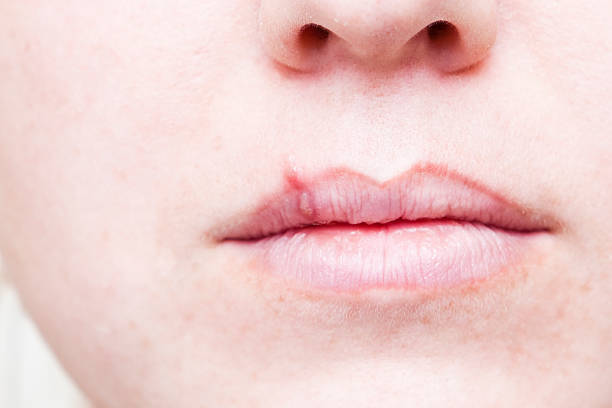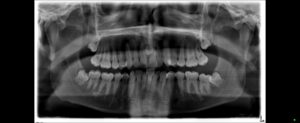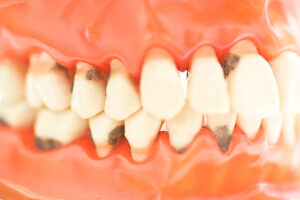The functional effectiveness of the highly complex oral space depends on overall health. Development of small lesions, called canker sores or aphthous ulcers, on the soft tissues of the mouth, can be painful and make eating and drinking difficult. Although. Canker sores go away in one or two weeks, but if it is unusually large and painful you should consult your dentist or oral hygienist immediately. It could be due to other underlying medical conditions needing detailed examination and treatment.
What is a Canker Sore?
Small rounded white or gray open wounds or ulcers with red border on the soft tissues of the mouth could be canker sore. It usually starts with a burning or tingling sensation 6 to 24 hours before sores become visible to the naked eye. Unlike cold sores—fluid-filled painful blisters which grow typically outside the mouth, canker sores develop inside the mouth. Although the exact cause of canker sores isn’t known, scientists link it to several factors working individually or collectively. Healthcare professionals categorize canker sore into these three types:
Minor canker sores: These are usually less than 1 cm and are more common among people of less than 20 years of age. It develops 3-4 times in a year but usually heals in a week. With normal at-home remedies, you can boost the recovery.
Major canker sores: Although not very common, these are bigger and could cause pain and discomfort. It heals in 2-3 weeks but leaves scars. You might need medications to ease pain and discomfort.
Herpetiform canker sores: These are small and appear in clusters of 10 to 100 sores, more common among old-age people. It heals in a week or so but could make eating and drinking difficult.
Symptoms of Canker Sore
Development of sores in the mouth could make eating, drinking, and even talking difficult. This could be more problematic if sores are unusually large and persist longer than average. Here are some of the systems of canker sore to help you initiate preventive measures before it starts affecting your normal oral functionalities:
- Development of rounded or oval sores of white and yellow center with red edges.
- It normally develops inside the mouth, under the tongue, inside cheeks and lips, the base of the gum, and on the soft palate.
- You might experience a tingling sensation at least 6 to 24 hours before it becomes visible
- It could be either alone or in clusters
- In some case of severe canker sores, it could cause fever, fatigue, and swollen lymph nodes
Pain and inflammation in and around the affected area
What Causes Canker Sores?
Healthcare professionals are not sure what causes canker sores in the mouth. However, studies suggest that it could be due to factors, like:
- Injury to soft tissues of the mouth due to aggressive brushing, a sharp tooth, or breakage of dental devices
- Stress-induced hormonal imbalance
- Overeating of citrus or acidic fruits could cause minor sores
- In some cases, sores could be due to non-steroidal anti-inflammatory drugs
- Allergic reaction to certain ingredients present in toothpaste or mouthwash
- Bacteria like helicobacter pylori
- Underlying medical conditions like lupus, weak immune system, etc
- Nutrient deficiency of Vitamin B12, B3, B9, Iron, or Folic acid
- Gastrointestinal irregularity
- Family history
- Menopause related hormonal changes
How Canker Sore is Diagnosed?
Canker sores are very common, and in most cases, patients recover easily with home remedies. If symptoms persist for long and it is large and painful, it is better to consult your dentist so that he could recommend some tests to diagnose the underlying cause:
Your doctor will physically examine your oral space and discuss aspects like occurrence frequency, medical history, and seriousness. Based on the primary examination, your doctor might recommend certain blood tests to know whether sores are caused by:
- Viral infection
- Deficiency of certain vitamins or minerals
- Hormonal imbalance
- Immune weakness
Canker Sore Treatment
People of any age group can develop canker sores, but they are more common among teens and adults, especially females. Canker sores heal naturally in one to two weeks, but you can recover faster without pain and discomfort to regain oral functionalities with certain OTC medication and remedies. Here are some of the remedies for treating long-lasting, larger, and painful canker sores:
Mouthwashes: Rinsing mouth with medicated mouthwash could help in easing pain. You can try salt or baking soda solution to rinse your mouth. You can use one teaspoon of table salt in ½ cup of lukewarm water to prepare the solution. For speedy results, try rinsing with saltwater 4-5 times per day. Baking soda is highly effective in restoring the pH balance of the oral space, so it helps in reducing inflammation.
Topical medications: If sores are large your doctor might prescribe topical ointment containing anti-inflammatory steroids and topical analgesic to manage pain.
Oral medications: Depending on the severity of the case, your doctor might recommend taking drugs to control ulcers and gouts. Steroid pills are also helpful in controlling core cankers spread.
Alum powder: The astringent properties of potassium aluminum sulfate, used for preserving food, are highly effective in shrinking tissues. Applying the paste of alum powder on sores helps in drying out canker sore, thus recovery will be faster. Leave it for 1-2 minutes and rinse the mouth thoroughly.
Yogurt: If the cause of canker sores is helicobacter pylori bacteria or inflammatory bowel disease, eating yogurt could help in easing discomfort. Studies suggest probiotic cultures help treat inflammatory bowel disease, so once the underlying cause is treated your canker sores will go away faster.
Honey: Applying honey, known for anti-inflammatory and anti-bacterial properties, on areas affected by canker sores could help ease pain and discomfort. It is better to use unpasteurized and unfiltered honey for better results.
Coconut oil: If the possible cause of canker sores is bacterial applying coconut oil can help in controlling them from spreading. Studies indicate that coconut oil has antimicrobial and anti-inflammatory properties, so applying it several times daily will help in controlling pain and redness.
Hydrogen peroxide: It is highly effective in controlling bacteria count in the mouth, thus boosts the healing of a canker sore. Prepare a mixture of 3% solution of hydrogen peroxide with water and apply it to the affected area using a cotton swab a few times a day to boost healing.
Milk of magnesia: Known for laxative and acid-neutralizing properties, milk of magnesia containing magnesium hydroxide is highly effective in restoring the pH balance of the mouth. Applying milk of magnesia on sore 2-3 times a day stops the spread of sores and reduces irritation and relieving pain.
Vitamin and mineral supplement: One common cause of canker sore is the deficiency of certain vitamins and minerals. Although the efficacy of vitamin supplements in treating sores isn’t established, studies show that it helps in boosting the immune system and inflammation control. However, you should consult your doctor before starting vitamin supplement medication as an overdose could cause some problems.
If the exact cause of canker sore is not known you can try other home remedies like anti-inflammatory chamomile and sage tea, immune-boosting Echinacea, DGL mouthwash, apple cider vinegar (ACV) mouthwash, and zinc lozenges to boost healing.
When to See Your Doctor?
Blame it on nutrition, lifestyle, or oral hygiene, but canker sores are not a cause of worry in most cases. However, in some cases, it might require medical intervention. Here are some of the signs to look for before you book an appointment with your doctor:
- If the sore is large and spreading
- Sores are in large numbers
- Sores are not healing within one or two weeks and new sores forming
- Sore is spreading to lips
- Causing unbearable pain
- Affecting your normal eating, drinking, and talking
- If sores are forming with fever and fatigue
How to Prevent Canker Sore Recurrence?
Canker sore develops very often, but you can prevent canker sore recurrence by following these tips:
- It is better to avoid eating food items that irritate your soft tissues. Foods that are too hard or crispy could damage soft tissues causing sores. Some citrus and acidic fruits could trigger canker sores spread.
- Nutrition balance is very important for a strong immune system, so eat healthy food rich in vitamins and minerals.
- There is no substitute for healthy oral hygiene habits, so follow standard brushing and flossing practices to keep oral space healthy and bacteria-free. You should better ask your dentist to prescribe high-quality toothpaste and mouthwash.
- If you are wearing dental devices, you should use orthodontic wax to protect soft tissue from possible injuries.
- One possible cause of canker sores is stressful life, so try therapies to reduce stress.
Bottomline
Your oral space is too delicate to endure the onslaught of harmful chemicals, microbes, and oral instruments. If you are not maintaining standard oral care practices, chances of canker sores or aphthous ulcers increase manifold. Thankfully, canker sores heal naturally with home remedies in just a week or so. If sores are causing unbearable pain and persist for longer than average, you should consult your dentist or oral hygienist for a thorough examination and suitable treatment. With the right treatment, you will have perfectly healthy oral space to smile freely in just a few days.
Sources:
- Tuft, L., & Ettelson, L. N. (1956). Canker sores from allergy to weak organic acids (citric and acetic): Case report and clinical study.
https://www.sciencedirect.com/science/article/pii/002187075690154X - Scully, C., & Shotts, R. (2000). Mouth ulcers and other causes of orofacial soreness and pain.
https://www.bmj.com/content/321/7254/162.short - Manesis, D. A. (1995). Thalidomide: an alternative therapy for treatment of apthous ulcers (canker sores).
https://pubmed.ncbi.nlm.nih.gov/11362397/ - Dalessandri, D., Zotti, F., Laffranchi, L., Migliorati, M., Isola, G., Bonetti, S., & Visconti, L. (2019). Treatment of recurrent aphthous stomatitis (RAS; aphthae; canker sores) with a barrier forming mouth rinse or topical gel formulation containing hyaluronic acid: a retrospective clinical study.
https://bmcoralhealth.biomedcentral.com/articles/10.1186/s12903-019-0850-1


